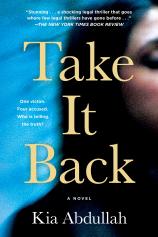Take It Back
Review
Take It Back
Already a bestseller in the UK, TAKE IT BACK now makes its American debut, introducing a whole new world of readers to Kia Abdullah’s taut plotting and brutal themes, all seen through the eyes of protagonist Zara Kaleel.
Zara is one of the best legal minds in her peer group, and was once on track to become one of the most successful barristers of her generation. But when she was coerced into an arranged marriage that quickly turned sour and cost her the esteem of her beloved father, Zara threw her posh life away. Now, instead of the high-profile career she once coveted, she works as a sexual assault advocate, someone who guides victims of rape through not only the complicated and often harmful legal process of achieving justice, but also the gossip of communities and the emotional trauma that comes from both the initial assault and its aftermath. Zara takes pride in the meaning of her work and her ability to bear witness to justice taking place in real time, but she is still battling her own dark demons: loneliness, fear and addiction.
When we meet Zara, she has just taken on a new case and is reviewing materials while she waits for the young woman to meet her. When Jodie Wolfe walks into her conference room, however, she is not prepared for what she sees: a 16-year-old girl with facial deformities and a horrific tale of abuse. Jodie was born with neurofibromatosis, a condition that causes tumors to form on otherwise healthy nerve tissue. And now she has been raped.
"TAKE IT BACK is a shocking and powerful novel, both for its subject matter and for the ways that Abdullah circumvents and upends her readers’ expectations of what a courtroom drama should be."
As Jodie tells it, the weekend before meeting Zara, she attended a party with her friend, Nina. She wore one of Nina’s lacy red tops and tried her best to conform, but found herself feeling out of place and left the party to sit in the park behind the house. It was there that a handsome young man, Amir Rabbani, approached her. He called her pretty, a compliment that Jodie had never received before, and spoke out loud about wanting to kiss her, another first. He then led her to an abandoned building nearby where his friends, Hassan, Mo and Farid, were waiting. After teasing her, calling her ugly and dehumanizing her, they sexually assaulted and raped her.
Any reader can recognize how hairy a case like Jodie’s can be: a young, disabled white woman accusing four young brown men of rape, in a world that devalues not only those from different cultures but also women. Zara, too, can immediately see the dangers of Jodie’s case, but as an advocate for victims, she feels that she must help her find justice. As Jodie prepares to make a statement to the police and undergo painful testing in search of evidence, Zara starts her own investigation, using a freelance private investigator with whom she has worked before.
Jodie’s case unfolds slowly at first and then at breakneck speed as the local gossip publications become involved, and her identity (as well as those of the suspects) is leaked to the press. Unpacking the early beginnings of the case, Abdullah writes from the perspective of each of the boys’ parents, all hardworking, devout immigrants who are as shocked by the accusations as they are protective of their sons. On the other side of the case, we have Jodie’s mother and her best friend, both of whom are often cruel to Jodie, either blaming her for lots in life or mocking her disability.
Neither Jodie nor her attackers are viewed as entirely innocent: the young men are seen as crude, savage immigrants, and Jodie herself is labeled a stalker, who had a long-term unrequited crush on Amir. With so many layers, not to mention Zara’s own role as a Muslim woman leading a charge against four boys from her own culture, the case quickly gains traction, with voices from all sides chiming in, laying blame and attacking the victim and perpetrators.
As Jodie and the boys go to court, TAKE IT BACK takes on the taut, tension-fueled pacing of some of the best legal thrillers. Abdullah deftly unpacks the courtroom drama with stunning reveals and brutal questioning, always careful to leave the door open to imagination and perception. Were the boys raised in misogynistic cultures, taught to view women as conquests? Or are they merely nice young men who took a chance on spending time with a troubled girl who had long been cast out of her peer group and harbored a crush that bordered on obsession? With Zara handling her own investigation, the barrister poking holes in lies from both sides, and the local hunger for a resolution, her life starts to unravel. Her addiction and her own unanswered traumas pull her focus away from what is sure to be her most high-profile case ever.
TAKE IT BACK is a shocking and powerful novel, both for its subject matter and for the ways that Abdullah circumvents and upends her readers’ expectations of what a courtroom drama should be. She writes the legal aspects of the story with clarity and confidence, but more than that, she forces her audience to consider the many divisions humans face long before a crime is committed: those of class, wealth, gender and race. The case at the heart of the novel is an undoubtedly tricky one, but Abdullah pushes her narrative even further by considering the complicated background of Zara and her colleagues. At the height of the case, Zara is asked by relatives, friends and strangers how she, a Muslim woman, can take the side of one misguided girl, and she must consider whether her allegiance is to Islam or to her fellow women. As a victim of abuse herself, Zara’s search for an answer comes with its own difficult and thought-provoking questions. When juxtaposed with Jodie’s case, her journey turns this already disturbing and brilliant legal thriller into something much more.
Perfect for readers of A GOOD NEIGHBORHOOD and THE NIGHT SWIM, TAKE IT BACK announces the arrival of an incredible new protagonist and will have readers desperate for TRUTH BE TOLD, Abdullah’s next novel, which will find Zara at the heart of yet another timely and divisive case.
Reviewed by Rebecca Munro on December 11, 2020




